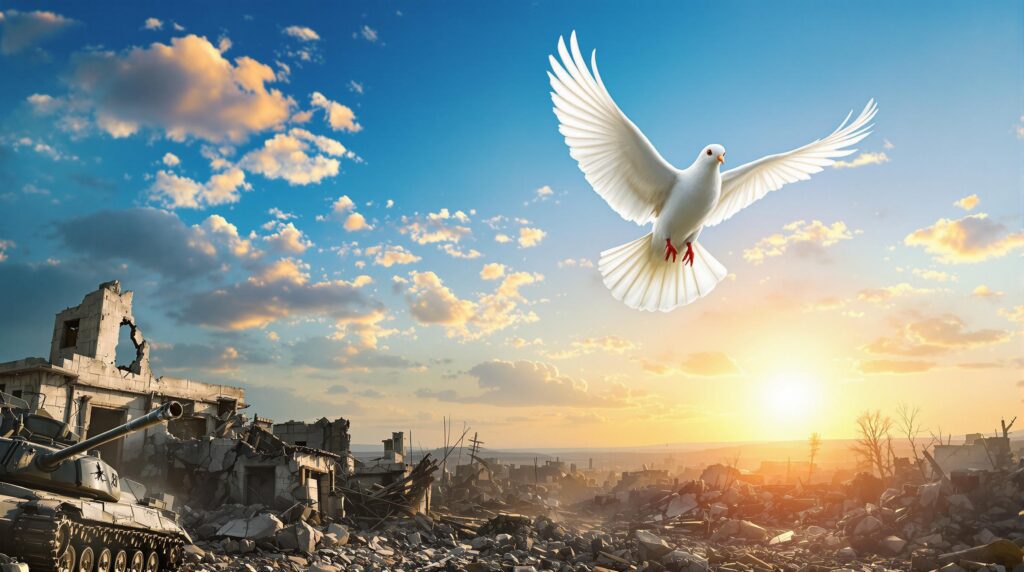As Pope Francis lies hospitalized battling pneumonia, his heartfelt plea from his hospital bed echoes around the globe. Struggling since February 14 with severe respiratory issues, the pontiff has utilized his period of illness to underscore a profound and urgent message: the destructive absurdity of war and the desperate need for renewed global collaboration.
A Moment of Reflection Amidst Crisis
In a poignant letter published by Italy’s esteemed newspaper Corriere della Sera, Pope Francis articulated a deep frustration with humanity’s recurring flirtation with violence. The Pope’s health struggles, marking his fourth and longest hospitalization during his twelve-year leadership, became a powerful backdrop for his stark message: the utterly tragic and fruitless nature of war. Reflecting on his illness, Francis wrote movingly about the clarity gained through personal fragility. “In this present moment of illness, war appears even more absurd,” he penned, challenging the world to recognize conflict’s disastrous consequences for communities and the environment alike.
These words from Pope Francis urge nations and citizens around the world to reassess their perspectives on conflict, advocating instead for diplomacy and dialogue. The urgency is palpable, emanating from his personal vulnerability as he recuperates from a critical health condition.
Journalism and the Power of Words
Francis does not only speak to governments and international bodies. He also directs a critical lens towards the media industry, highlighting its crucial role in shaping global perceptions. In these turbulent times, he stresses, responsible journalism is pivotal: “Words can either connect or divide, serve the truth or use it,” he emphasized. The media, according to Francis, holds power that must be wielded with increased responsibility, and it’s imperative to recognize this force’s significance.
This critique implicates media outlets worldwide, urging members of the press to reassess their role in either escalating tensions or fostering understanding. Pope Francis offers a moral compass, suggesting how mindful reportage can steer societies towards peace rather than conflict.
Recalibrating Diplomacy and International Commitment
Francis’s sickness coincides with a noticeable escalation in global conflicts, from Ukraine to Gaza, from Yemen to Sudan. His message becomes a call for complete and fundamental rethinking about how diplomacy is conducted. He proposes a rejuvenation of diplomatic interventions, driven by “new vitality and credibility” in international institutions and negotiations—a hopeful assertion that international dialogue, not aggression, is the essential foundation of any meaningful resolution.
It’s timely advice; in an era where diplomatic retreats and hardline nationalism too often dominate the discourse, Pope Francis insists on renewed cooperation rooted in compassion and active peacebuilding. His encounter with illness underscores this, amplifying his appeal for global unity and diplomacy.
“In times of illness, clarity arrives—revealing just how absurd and senseless war truly is,” Pope Francis stated.
Ongoing Health Concerns and Global Implications
Worries about Pope Francis’s health have rippled across the world, sharpened by the severity of his current hospitalization. At 88, he faces complex lung issues, requiring continuous medical interventions, such as reducing his dependency on non-invasive oxygen assistance at night. Cardinal Pietro Parolin, the Vatican’s Secretary of State, has reassured the public, noting marked improvements during his recent visits. Yet, despite this cautious optimism, the Vatican has yet to confirm a discharge timeline, indicating ongoing medical caution.
Despite these uncertainties, global attention remains fixed eagerly awaiting his recovery. Upcoming engagements, such as King Charles III’s reported plans to meet the Pope on April 8, underscore his immense international relevance, even as he battles through personal illness. Vatican officials strongly contest rumors of any imminent resignation, underscoring Francis’s dedication and resilience in leadership.
The Relevance of Francis’s Appeal
It’s significant that Pope Francis’s broad appeal against war occurs during a moment of personal vulnerability. It reminds leaders and citizens alike of the interconnectedness of human frailty, dignity, and global security. His words implore an urgent reconsideration of violence as a political tool, emphasizing collective well-being, environmental stewardship, and social justice.
As Pope Francis recovers, the international community has an opportunity to heed his words, recommit to peaceful dialogue, and foster a more compassionate world. The pontiff’s hospitalization represents more than a mere medical event; it’s a clarion call for renewed humanity, reason, and political integrity. His message, delivered powerfully from a hospital bed, demands to be heard and acted upon—not just by Catholics, but by people of all nations and faiths.

